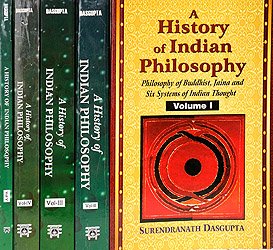A History of Indian Philosophy Volume 4
Indian Pluralism
by Surendranath Dasgupta | 1949 | 186,278 words | ISBN-13: 9788120804081
This page describes the philosophy of testimony: a concept having historical value dating from ancient India. This is the seventh part in the series called the “madhva logic”, originally composed by Surendranath Dasgupta in the early 20th century.
Part 7 - Testimony
Madhva and his followers admitted only three kinds of means of knowledge, namely, perception, inference, and the testimony of the Vedas. All other kinds of means of knowledge (pramāṇa) admitted in other systems, such as arthāpatti, sambhava, etc., are shown to be but modes of inference[1]. The Vedas are regarded as having by themselves independent force of knowledge. They are uncreated (apauruṣeya) and eternai (nitya). They are valid means of knowledge, and yet, since their validity is not derived from the speech of any person, they must be regarded as uncreated[2]. No attempt, however, was made to prove that the Vedas were valid means of knowledge; but, as their validity was not questioned by any of the Hindu schools, that was taken as accepted, and then it was argued that, since they were not uttered by anyone, they were uncreated and eternal. It was sought to establish this uncreatedness of the Vedas as against the Nyāya view that they were created by God (Īśvara). Vyāsa-tīrtha argues that it is better to accept the direct validity of the Vedas on the ground of their being uncreated, than to do it in an indirect way through the admission of an omniscient being as their author; for there is no certainty that even such authors would not try to deceive mankind by false statements. Buddha himself is an incarnation of God, and yet he deceived the people by false teachings. Tradition also does not ascribe any author to the Vedas. If they had been created, they would be of the same kind as the holy scriptures of the Buddhists or Jains. If the importance of scriptures were to be judged by the number of people who followed them, then the Mahomedan scriptures would have a superior place. God may be regarded as the great teacher of the Vedas, being the first person who uttered and taught them[3]. He did not create them and He remembers them always; so that there is no chance of the Vedic order of words being destroyed. Ordinarily the claim of facts to validity is prior to that of the words which express them, and the latter depends on the former; but in the case of the Vedas the words and passages have a validity which is prior to facts and independent of them. The Madhva view thus combines the Nyāya and the Mīmāṃsā views of the Vedas without agreeing with either.
Footnotes and references:
[1]:
Pramāṇa-paddhati, pp. 86-90.
[2]:
pauruṣeya-śabdāpramāṇakatve sati sapramāṇakatvāt.
Tarka-tāṇḍava (MS., p. 100).
[3]:
īśvaro’pi hy asman-mate.... Veda-saṃpradāya-pravartakatvān mahopādhyāya eva.
Ibid. p. 122.
